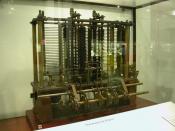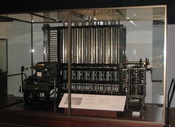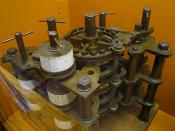Computers play a very important role in modern-day life and effect us no matter where we are or where we go. There are many different types of computers, some as old as 5,000 years. It is believed that the first computer was the abacus. This device allows users to make computations using a system of sliding beads arranged on a rack. Early merchants used the abacus to keep trading transactions. But as the use of paper and pencil spread, particularly in Europe, the abacus lost its importance. It took nearly 12 centuries, however, for the next significant advance in computing devices to emerge. Blaise Pascal created the next major computing device in 1642. He developed a numerical wheel calculator to help with his job as a French tax collector. This brass rectangular box, also called a Pascaline, used eight movable dials to add sums up to with figures long. Pascal's device used a base of ten to accomplish this.
In 1694, a German mathematician and philosopher, Gottfried Wilhem von Leibniz improved the Pascaline by creating a machine that could also multiply. This machine also used the common components such as wheels and dials. It wasn't until 1820 when mechanical calculators were used more commonly.
"The real beginnings of computers as we know them today, however, lay with an English mathematics professor, Charles Babbage. Frustrated at the many errors he found while examining calculations for the Royal Astronomical Society, Babbage declared, "I wish to God these calculations had been performed by steam!" With those words, the automation of computers had begun. By 1812, Babbage noticed a natural harmony between machines and mathematics: machines were best at performing tasks repeatedly without mistake; while mathematics, particularly the production of mathematic tables, often required the simple repetition of steps. The problem centered on applying...


